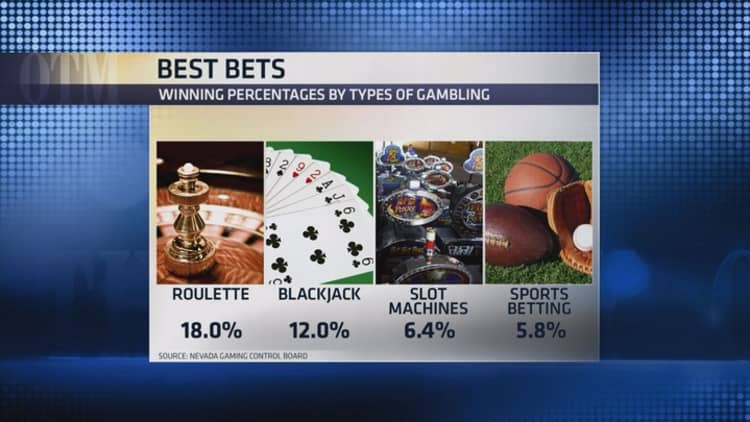
To many fans, Sunday's Super Bowl victor is less important than their daily fantasy sports wagers and the very real cash they could win.
Along with the rapid growth of fantasy sports betting sites FanDuel and Draft Kings, has come increased scrutiny and questions about whether daily fantasy sport betting is even legal.
At least $26 billion changes hands in the budding fantasy industry. So is it just a game, or is it gambling?
Attorneys general in six states have declared the daily fantasy games a form of gambling or illegal under state laws, including New York, Texas, Illinois, Hawaii, Vermont and Mississippi. Yet last week, Rhode Island's attorney general declared the activity legal but said it needs to be regulated.
The fantasy sports industry and their attorneys argue it's not gambling because it's a "game of skill" rather than luck. Those who side with the states, however, have an entirely different take.
"Daily fantasy sports are gambling because it is a game of chance," Timothy Fong, co-director of University of California at Los Angeles' Gambling Studies Program told CNBC's "On the Money" in an interview.
Fong argued that any event can alter the game, and "just a single moment in time that determines outcome, which is essentially gambling."
Proponents of fantasy betting disagree. "It's a game of skill," says Rick Horrow, sports attorney and CEO of Horrow Sports Ventures. Horrow told CNBC that fantasy sports isn't entirely unlike how adolescents used to wager on games—which he himself did as a kid.
Decades ago, "I would send draft picks in the mail to friends and we would play a forerunner of fantasy," Horrow said, adding that the modern day version is " basically the evolution of technology to catch up with what people want."
Nearly 57 million people play fantasy sports in the U.S. and Canada, according to the Fantasy Sports Trade Association, and 66 percent of players are male. The average age is 37.
In spite of the hullaballoo, Horrow says only a small percentage of fantasy users actually play the daily wagers. "Frankly, five percent of the entire industry is daily fantasy…the rest is fantasy on a seasonal basis that nobody questions."
Yet UCLA's Fong also drew a distinction between daily fantasy sports wagers and fantasy sports competitions that encompass the whole sports season.
"Season-long fantasy sports is not gambling," says Dr. Fong, "It's skill-based because people are constantly making moves, things are changing."
In daily fantasy sports, for a fee, users compete against each other, trying to pick the best players for their virtual team. The winner is determined by the players' stats on that day, and a cash prize is awarded.
Professional sports leagues, including the NFL, NBA, and Major League Baseball, have all invested in fantasy sports companies to some degree. Horrow says the companies will prevail in fantasy sports industry "are the ones that are going to figure out how to use the communal aspect of these games."
By far, football is the most popular fantasy sport. According to Ibisworld, 36 percent of industry revenue is from the NFL. That's followed by Major League Baseball with 19 percent, auto racing at 12 percent and the NBA at 10 percent.
With all that money floating around, people like Fong think the industry should be strictly monitored at the very least.
"This is a form of gambling and it should be regulated," says Fong. However, "it's entertainment, a modern day form of entertainment that can bring people together."
Horrow added that "fantasy is a communal activity, whether it's mobile or otherwise it is going to evolve."
Disclosure: Comcast, the parent company of CNBC, is an investor in FanDuel.
On the Money airs on CNBC Saturday at 5:30 am ET, or check listings for air times in local markets.





